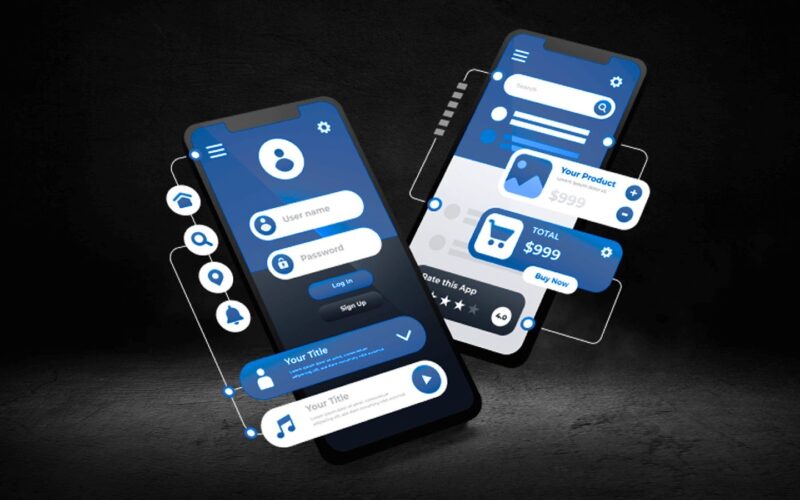Fintech software enables banks, lenders, and startups to develop tools such as digital wallets, credit platforms, and automated investment apps. You’ve probably used one today, UPI, Google Pay, or a loan approval app that works in minutes.
As more businesses go digital, the demand for custom fintech solutions is growing fast. In fact, the global open banking market alone is set to reach $123.7 billion by 2031, up from just $13.9 billion in 2020.
But building a fintech app isn’t simple. It needs to be secure, compliant, fast, and user-friendly. This guide on the top fintech software development companies in 2025 helps you find the right team without second-guessing every choice.
TL;DR
- AI & Blockchain are reshaping fintech software by enabling real-time fraud detection, secure transactions, and personalized services.
- Fintech companies must develop modular, API-first architectures that ensure scalability and seamless integration with legacy systems and third-party platforms.
- Compliance is not optional. Fintech software must be designed with security and regulatory standards (e.g., GDPR, PSD2) in mind from day one.
- The top fintech development companies, such as Accenture, ThoughtWorks, and Codewave, lead the industry with solutions that are future-proof, scalable, and secure.
- User experience is key. Fintech apps need to be intuitive, responsive, and easy to use while integrating strong security measures like biometrics and MFA.
The Evolving Scenario of Fintech Software Development
Today, fintech is a technology revolution. Financial software isn’t just about processing transactions anymore; it’s about enabling real-time decision-making, delivering personalized financial services, and fostering trust through robust security and compliance measures.
However, the road to this transformation isn’t paved smoothly. Fintech companies are balancing speed, scalability, security, and compliance in an environment where failure is not an option.
As fintech becomes a strategic asset, software development must meet these heightened demands with agility and precision.
- AI’s Expanding Role in Risk Management & Personalization
AI is shifting from an experimental tool to a business imperative in fintech. It isn’t just automating backend processes anymore; it’s now predicting risks, detecting fraud, and even driving real-time investment advice.
- Blockchain as the Backbone of Secure Financial Ecosystems
Blockchain’s promise extends far beyond cryptocurrencies. Its decentralized ledger technology ensures transparency, lowers costs, and enhances data integrity across the financial services sector.
- The API Revolution: Open Banking and Seamless Integrations
Open Banking has led to the API revolution in fintech, enabling third-party developers to build new services on top of traditional banking. It allows fintechs to integrate with legacy systems and other financial platforms seamlessly.
- The Growing Priority of Cybersecurity and Regulatory Compliance
The rise in digital banking and mobile payments has made cybersecurity and compliance top priorities for fintech companies. Today, fraud prevention and compliance automation are driving the development of numerous new fintech solutions.
What Does This Mean for Fintech Software Development?
The combination of AI, blockchain, and open APIs is redefining what’s possible but also raising the bar for software developers.
To stay competitive, fintech companies need to:
- Build modular, API-first architectures that enable rapid scaling and seamless integration with third-party services.
- Ensure that security and compliance are embedded into every layer of development — from coding to testing.
- Adopt agile development practices to keep pace with evolving technologies and market demands.
Fintech software development is no longer about building a product. It’s about creating systems that are secure, adaptable, and integrated across a constantly shifting technological and regulatory scene.
For more insights on how AI is transforming the fintech landscape, explore our blog on AI Use Cases in Fintech.
Now, let’s examine the top fintech software development companies that are leading the charge in creating innovative, secure, and scalable fintech solutions.
Top 10 Fintech Software Development Companies in 2025
The global fintech market is projected to reach $394.88 billion in 2025, with an anticipated CAGR of 16.2% through 2032. As this industry expands, so does the demand for specialized software solutions that can efficiently manage complex financial operations.
Here are 10 standout fintech software development companies that are leading the charge in 2025, shaping the future of financial services:
1. ThoughtWorks
A global leader in software development, ThoughtWorks combines deep technical expertise with innovative financial solutions. They specialize in building high-performance banking platforms, payment solutions, and blockchain integrations.
- Headquarters: Chicago, USA
- Services: Core banking systems, AI-powered analytics, blockchain solutions, cloud platforms.
- Notable Clients/Projects: HSBC, Zurich, Citi.
- Tech Specialties: Java, Ruby, Python, Kubernetes, AWS.
2. Accenture
Accenture provides end-to-end fintech solutions, from digital banking transformation to AI-powered decision-making. They help companies modernize their infrastructure while maintaining compliance.
- Headquarters: Dublin, Ireland
- Services: Core banking modernization, digital wallets, blockchain, regulatory compliance solutions.
- Notable Clients/Projects: Mastercard, Barclays, Lloyd’s of London.
- Tech Specialties: Java, Python, React, Azure, SAP.
3. IBM
IBM’s fintech solutions are built on AI, blockchain, and cloud technologies, driving secure payments, data protection, and regulatory compliance in the financial services industry.
- Headquarters: Armonk, USA
- Services: Blockchain solutions, AI-driven analytics, core banking solutions, risk management.
- Notable Clients/Projects: JPMorgan Chase, Deutsche Bank, US Bank.
- Tech Specialties: Python, Node.js, IBM Cloud, Hyperledger.
4. Capgemini
Capgemini specializes in digital transformation, offering fintech consulting to software development services with a strong focus on cloud and blockchain. Its ability to integrate emerging technologies into financial services makes it a key player.
- Headquarters: Paris, France
- Services: Blockchain development, cloud banking, AI solutions, regulatory technology (RegTech).
- Notable Clients/Projects: American Express, HSBC, Santander.
- Tech Specialties: Python, Java, AWS, Azure, Kubernetes.
5. Infosys Finacle
As a leader in core banking software, Infosys Finacle is known for innovative solutions that enable digital transformation for banks, payment processors, and fintech firms globally.
- Headquarters: Bangalore, India
- Services: Core banking systems, digital wallets, real-time payments, customer experience solutions.
- Notable Clients/Projects: ICICI Bank, Standard Chartered, Sberbank.
- Tech Specialties: Java, Angular, Kubernetes, AWS, Oracle.
6. Wipro
Wipro delivers comprehensive fintech software solutions that combine cloud, AI, and blockchain to drive financial innovation across payments, lending, and regulatory compliance.
- Headquarters: Bengaluru, India
- Services: Digital banking, blockchain, AI-powered analytics, cloud platforms.
- Notable Clients/Projects: HSBC, Wells Fargo, Visa.
- Tech Specialties: Java, Python, React, Azure, Kubernetes.
7. SoftServe
SoftServe is an innovation-driven technology solutions provider. It offers custom fintech software development with a strong focus on AI, cloud-native applications, and digital banking.
- Headquarters: Austin, Texas, USA
- Services: Digital banking solutions, AI-powered customer service, cloud-based payment systems, regulatory technology (RegTech).
- Notable Clients/Projects: HSBC, Credit Suisse, PayPal.
- Tech Specialties: Java, Python, Kubernetes, React, AWS, Google Cloud.
8. TCS (Tata Consultancy Services)
TCS has a strong focus on AI-driven financial solutions, specializing in cloud computing and data analytics for fintech applications. It specifically leads with advanced AI and blockchain solutions, empowering banks and fintech startups to innovate securely.
- Headquarters: Mumbai, India
- Services: Blockchain solutions, core banking platforms, data analytics, cloud infrastructure.
- Notable Clients/Projects: Bank of America, Citigroup, SBI.
- Tech Specialties: Java, Python, Node.js, Azure, AWS.
9. Cognizant
Cognizant is a prominent provider of digital banking solutions and next-gen fintech software that incorporates AI, cloud, and data analytics. Its focus on intelligent automation helps financial institutions scale and innovate rapidly.
- Headquarters: Teaneck, USA
- Services: Digital banking, AI integration, cloud applications, blockchain.
- Notable Clients/Projects: HSBC, JPMorgan, Zurich.
- Tech Specialties: Java, React, Angular, AWS, Python.
10. Fiserv
Fiserv specializes in building payment solutions, digital banking systems, and core banking technology, driving digital transformation in the financial services industry.
- Headquarters: Brookfield, USA
- Services: Payment processing, core banking, digital wallets, API-driven solutions.
- Notable Clients/Projects: Bank of America, Wells Fargo, American Express.
- Tech Specialties: Java, Python, Node.js, Docker, AWS.
These top fintech software development companies are leading the way in delivering innovative solutions. You must find the right development partner that is scalable, secure, and compliant.
Additionally, specialized players like Codewave ensure that your fintech software is built on a foundation that supports growth, security, and compliance well into the future.
Best Practices for Building Top Fintech Software
Building fintech software in 2025 means balancing innovation with security, scalability, and regulatory compliance. To stay competitive, here are the best practices every fintech company should adopt:
1. Build Security into the Core
Security is non-negotiable. From end-to-end encryption to multi-factor authentication (MFA), ensure security is integrated from the ground up. With data breaches in fintech costing over $5 million, incorporating security during the design phase is essential.
2. Adopt Agile Development
The fast-paced fintech scene demands flexibility. Use agile methodologies to release software in iterations, allowing for quick adjustments to evolving market needs and customer feedback.
3. Comply by Design
Regulations like GDPR, PSD2, and FATCA are tightening. Fintech software should be compliance-ready from the start, ensuring that all features are built to adapt to regulatory changes and minimize risk easily.
4. Prioritize Scalability
Ensure your software can handle rapid growth. Design with cloud-native architecture, enabling seamless scaling, especially during high transaction volumes. Modular, microservices-based design allows quick scaling and future-proofing.
5. Focus on User-Centered Design
A smooth user experience (UX) is crucial for customer retention. Prioritize intuitive navigation, fast load times, and responsive interfaces. User testing should be part of every release cycle.
6. Implement Continuous Integration and Delivery (CI/CD)
Automate testing and deployment with CI/CD pipelines. This allows for faster, more reliable releases and ensures your software remains bug-free and up-to-date with minimal downtime.
7. Enable Real-Time Data Processing
Fintech depends on real-time decision-making. Implement real-time data processing to support applications like fraud detection and instant trading, using technologies like Apache Kafka and AWS Kinesis.
By integrating these strategies, fintech companies can develop systems that are reliable, future-proof, and able to scale with the rapidly changing market.
Looking to build innovative fintech solutions? Discover our Fintech Software Development Services and learn how Codewave can help you create secure, scalable, and future-proof platforms.
With a solid understanding of best practices, let’s understand the challenges companies face during fintech software development and how to overcome them for long-term success.
Common Pitfalls and How to Overcome Them
While the fintech industry offers enormous opportunities for growth and innovation, building and deploying top-tier fintech software isn’t without its challenges. Below are the most common obstacles fintech companies face and actionable strategies to overcome them:
1. Security & Compliance Complexity
The fintech sector is a prime target for cyberattacks. The increasing number of regulations (e.g., GDPR, PSD2) adds further complexity to the development process.
How to Overcome:
- Implement security-first development. Use encryption and MFA in every layer.
- Integrate compliance automation tools to stay ahead of regulatory changes.
- Conduct regular security audits and penetration testing.
2. Integrating with Legacy Systems
Fintech companies often face integration issues with outdated core systems, hindering scalability and flexibility.
How to Overcome:
- Move to modular, API-driven architectures for seamless integration with legacy systems.
- Migrate legacy systems to cloud-based solutions to facilitate easier updates and integration.
- Begin with pilot programs to test integrations before implementing them on a full scale.
3. Scaling the Infrastructure
As fintech companies grow, their systems must handle increased transaction volumes while ensuring real-time performance.
How to Overcome:
- Build with cloud-native solutions (AWS, Azure) for automatic scaling.
- Use microservices to ensure components scale independently.
- Optimize data pipelines for real-time processing and low latency.
4. Attracting & Retaining Skilled Talent
The fintech industry faces a talent shortage, particularly in areas like AI, blockchain, and cybersecurity.
How to Overcome:
- Partner with fintech development agencies to access expert talent quickly.
- Offer continuous learning opportunities to upskill existing teams.
- Use AI-based development tools to automate routine coding tasks, reducing the dependency on large teams.
5. Gaining Customer Trust
Fintech software must earn customer trust, particularly in areas like data privacy and transaction security.
How to Overcome:
- Provide clear, transparent information about data handling and security protocols.
- Integrate real-time fraud detection systems and notify customers instantly of suspicious activity.
- Offer secure onboarding with biometric verification and two-factor authentication (2FA).
We’ve covered a lot of ground on what makes top fintech software so crucial for the industry’s future. But with all the new technologies and trends, it’s tough to figure out where to begin or how to make them work for your business.
That’s where Codewave comes in.
Why Codewave is Your Best Partner for Fintech Software Development?
The global fintech industry is projected to surpass $394 billion by 2025, underscoring its enormous potential for growth and transformation. To stay competitive, your business needs to move quickly, but also smartly, with the right technologies in place.
Whether you’re looking at AI, blockchain, or building your infrastructure for the future, you need solutions that work today and tomorrow.
Here’s how Codewave can help you get there:
- Tailored Solutions: We don’t just implement generic tools. We design custom solutions that fit your business, goals, and industry needs, ensuring that the tech works for you, not the other way around.
- Scalable and Flexible: Whether you’re just starting or growing fast, we build solutions that scale with your business, handling your needs today and adapting to new challenges in the future.
- Effortless Integration: Whether you’re working with existing systems or starting from scratch, we ensure that the new solutions integrate seamlessly into your operations, reducing complexity and making the process smooth.
- Real Impact: We don’t just build software; we build systems that deliver real value like increasing efficiency, improving customer satisfaction, and driving long-term growth.
If you’re ready to bring your fintech vision to life, we’re here to help. Let’s build something that works for your business and takes it to the next level.
Schedule a free consultation with our experts today, and let’s talk about how we can make your next fintech project a success!
FAQs
1. How can fintech companies integrate AI without compromising data security?
Fintech companies can integrate AI by using secure AI frameworks and incorporating data encryption, multi-factor authentication (MFA), and secure cloud services. Ensuring end-to-end encryption and AI model explainability also helps mitigate security risks while leveraging AI’s capabilities.
2. What is the role of blockchain in scaling fintech platforms?
Blockchain enables fintech platforms to scale by facilitating secure, decentralized transactions and reducing operational costs. By using smart contracts and distributed ledgers, fintechs can increase transaction speed, cut intermediaries, and provide greater transparency across the system.
3. How do fintech companies address the challenge of integrating with legacy banking systems?
The key to integrating with legacy systems is adopting API-driven architectures and modular frameworks. By gradually transitioning legacy systems to cloud-based infrastructure, fintech companies can ensure seamless integration and enhanced scalability without overhauling their entire system.
4. What are the most critical compliance considerations when developing fintech software in 2025?
The most critical compliance considerations are data privacy (GDPR, CCPA), transaction transparency (PSD2), and ensuring anti-money laundering (AML) and know-your-customer (KYC) protocols are built into the software. Regular regulatory updates and automated compliance tools can help fintechs stay on top of evolving laws.
5. How do fintech companies ensure a seamless user experience while adhering to strict security standards?
Fintech companies achieve a seamless user experience by implementing user-friendly interfaces and minimizing friction during processes like onboarding, while integrating biometric authentication and behavioral analytics. Continuous UX testing and adaptive security layers help strike a balance between security and the user journey.
Codewave is a UX first design thinking & digital transformation services company, designing & engineering innovative mobile apps, cloud, & edge solutions.







